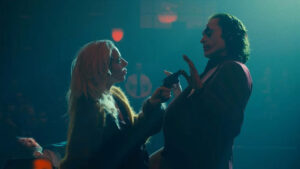Joker: Folie à Deux (2024) review
Dir. Todd Phillips
By: Steve Pulaski
Rating: ★★½
One of the reasons Joker: Folie à Deux exists is because Joaquin Phoenix himself claimed he “couldn’t stop thinking” about all the possibilities that remained for the character of Arthur Fleck. Ironically, the sequel to Joker, a runaway, controversial hit back in 2019, which itself feels like a millennium ago, feels like a smattering of ideas, some of them great, some of them downright undercooked.
Joker was always intended to be a standalone film, but a surprise $1 billion box office haul and an actor’s willingness to starve himself down 50 pounds all over again will inevitably produce a follow-up. The thoughtful analysis from both sides of the critical aisle on Joker was fascinating to consume. I thoroughly enjoyed it, despite its occasional lack of specificity in the direction of its anger coupled with its derivative narrative. Now, the sequel arrives wrapped in an entirely different package. Joker: Folie à Deux is a mix of gritty realism and musical stylings; periodically arresting as it revolves around Arthur Fleck’s life since his series of murders, including that of a talk show host on live TV.

The story picks up two years after Fleck’s murders; he’s spent them incarcerated in Arkham Asylum, awaiting his competency hearing. If Arthur is found sane, he will stand trial, with the death penalty a serious possibility. His lawyer, Maryanne Stewart (Catherine Keener), is eyeing to make the case that it wasn’t Arthur, but his split “Joker” personality, who committed those crimes. Arthur just passively accepts whatever comes his way, be it the occasional cigarette, or physical abuse from the guards (one of whom a blackly funny Brendan Gleeson). Enter Lee Quinzel (Lady Gaga), a fellow inmate, who doesn’t hide her love for Joker. She tells Arthur that she watched the TV movie about his life over 20 times.
Invigorated at the thought that somebody actually loves him (even if it’s only half of him), Arthur marinates over these newfound feelings through daydreams involving elaborate song and dance. During the sporadic times he does get the chance to meet up with Lee, the two share the kind of passion and childlike exuberance only enjoyed by star-crossed lovers. Director Todd Phillips’ approach to the music is having most of the numbers exist in Arthur and Lee’s heads in a sort of shared psychology manner (or, shall I be fancy and say folie à deux?). There are instances where Arthur does sing in reality, which in turn amplifies the discomfort for everyone, including the audience.
The musical numbers themselves are aesthetically pleasing in the same way a visualizer generally is. They are underscored by Old Hollywood aesthetics such as theater marquees, late-night TV sets, and the breed of romanticism cultivated when both a male and female perform a duet. Yet Joker: Folie à Deux is so thin in the story department that these musical numbers feels like diversions for an insufficient plot. The back-half of the film is basically a courtroom drama, one that does pack some emotional wallops and dark comedy, but one that goes on for far too long as we are forced to wallow in the pathetic, helpless nature of Fleck.
If the long-winded trial scenes contextualize anything, it’s how we as a society have made otherwise serious circumstances like celebrity courtroom drama and political debates endless entertainment fodder. This, of course, isn’t an observation on a new phenomena Phillips and co-writer Scott Silver are making. You can go all the way back to the O.J. Simpson trial to see the masses gripped by legal proceedings as if it were daytime television. One would think a sequel would provide another opportunity for Phillips and Silver to contextualize precisely the kind of commentary they want Arthur Fleck’s sad story to emblemize. Instead, we’re treated to a similar malaise of contradictory messaging. At times, Joker wants to revel in Fleck’s madness and play it for laughs. At times, it wants to wag its finger at the failed social and economic systems that helped birth someone like Fleck. And then at others, such as the film’s breakneck climax, it doesn’t know what to do besides let all hell break loose before a heavily telegraphed conclusion.

It would be easier to dismiss Joker: Folie à Deux if not for its performances. Once again, Joaquin Phoenix’s conveys Fleck’s perpetually turbulent emotional state with tremendous discipline; his gaunt physique about as scary as anything shown in a horror movie this year. Lady Gaga unsurprisingly shines when she breaks into song, but as was the case with her in A Star is Born, I find her about as captivating as an actress as I do as a performer. She shines even in the quiet moments with slyly shifty eyes as well as a still-present warmth that’s been subdued by forces beyond her control. The performance with which I found myself most smitten was that of Leigh Gill, who plays a friend of Arthur’s, who has to stand trial while his colleague interrogates him in full-Joker garb. It’s an affecting sequence thanks to the raw emotion Gill so naturally delivers.
Perhaps the film’s subtitle, French for “madness for two,” signifying shared delusion, is also a reference to this sequel’s quality. There’s about an equal number of positives as there are maddening shortcomings, something that I can’t help but feel shouldn’t be the case for one of the most incendiary major motion pictures of the 21st century.
Starring: Joaquin Phoenix, Lady Gaga, Catherine Keener, Brendan Gleeson, Zazie Beetz, Harry Lawtey, Steve Coogan, and Leigh Gill. Directed by: Todd Phillips.
About Steve Pulaski
Steve Pulaski has been reviewing movies since 2009 for a barrage of different outlets. He graduated North Central College in 2018 and currently works as an on-air radio personality. He also hosts a weekly movie podcast called "Sleepless with Steve," dedicated to film and the film industry, on his YouTube channel. In addition to writing, he's a die-hard Chicago Bears fan and has two cats, appropriately named Siskel and Ebert!


